FEELINGS RUN FASTER: A DISCUSSION WITH YANKI YAZGAN
By Yeşim Yemni for the Guide Istanbul, March-April 2013
Istanbul is a city that elicits extreme reactions from both its residents and visitors. Love it or hate it, can’t wait to leave it, or can’t live without it, one thing is certain: this city will not leave you cold. Yet even the most ardent Turofile, the most passionate Istanbul-lover, will have their moments of sheer despair; those times when they throw up their hands in frustration, either at the notorious traffic, or for a lack of understanding of Turkish culture.
Feelings Run Faster: A Mind/Brain Perspective On Living In Istanbul, a recently published book written and illustrated by the well-known psychiatrist Yankı Yazgan, attempts to make some sense out of the maddening, beguiling, web of caos that is Istanbul. More specifically, the book aims to create an understanding about “daily life through a perspective informed by cognitive neuroscience and psychology” while taking Istanbul as an example. Yazgan is already very well-known in Turkey as a writer, speaker and psychiatrist, but this book is his first work published in English.
I recently had the chance to sit down with Yankı Yazgan to discuss Feelings Fun Faster, as well as his work in general. One of the first questions I asked was why he decided to write this book in English? Surely he could have reached a larger audience if he were to write in Turkish, his native language, particularly since he is already well-known in Turkey. He explained that there were a number of factors behind this decision: One of the main reasons was to reach a wider and more diverse audience, and to get feedback and access to an English readership. But Yazgan says that he also wanted to challenge himself. Since he is virtually unknown outside of Turkey as an author and cartoonist, this book was a way of starting from scratch, so to speak.
As can be seen by his previous work, Yazgan has an interest in ‘teaching’ the general public about science and methods of thinking, and putting this information to use in daily life. He likes to use his writing and illustrations as a way to convey a message, to focus on how to make the best of neuroscience knowledge for use in our daily lives. Importantly, he also wanted to write a book about Turkey that was written by a Turk, and saw that there was an unmet demand for this. The book is aimed not only at foreigners who are living here or visit often, but also at anyone who has an interest in Turkey. And of course for those who have an interest in the intersection of neuroscience and psychology.
Yazgan stresses that the book is not about the “Turkish brain,” but about how our brain operates in different contexts. Many things that he describes in the book are not unique to Turkey, but the way that they coincide and acumulate here is what makes Turkey unique. He says that the book is not about Istanbul per say, but about living in Istanbul. “The book has been inspired by experiences accumulate in Istanbul, but not necessarily limited to Istanbul itself. Remembering that Istanbul is still local and peripheral in many respects, we should also recognize the universality of our experiences.” Yazgan says that the book does not offer the secrets to daily Turkish life, but it does offer some insights and interesting ways of looking at our experiences in the city.
The book is divided into five sections: Turkish Coffee, Happiness, Others, Love, and Time and Place. Each section offers various examples of daily Turkish life, complete with illustrations. In fact, the playful and amusing illustrations are one of the most unique aspects of the book, adding humor and color. Yazgan says that he organized the book in this particular way to try to make it “like a menu that would satisfy all needs,” and moves from the particular to the general. The beginning and ending sections are arguably the most interesting or accessible to a broad audience, and the most Turkish-specific, while the middle sections are more scientific, although still aimed at the layman.
Feelings Run Faster is peppered with pop cultural references, and while many of these references are Turkey-specific, particularly those dating back to his youth, it should come as no surprise in our globalized culture that many of them would be just as familiar to a Western reader. Everything from the novels of Atwood and Marquez, to HBO dramas such as In Treatment are referenced in the book. This servers to make the book more accessible to a broader audience, for as Yazgan notes, pop culture is now an essential part of our lives and is also a product of our lives – not just big media shaping our thinking. There are also a great many personal examples from Yazgan’s own life, such as his childhood circumcision photo, or a cartoon he drew while doing his mandatory military service. Indeed, he book very often draws on Yazgan’s own experiences growing up here for illustrative examples.
Yazgan is a born bred Turk, who was raised in Izmir, which gives him the advantage of having insights from both an insider and outsider perspective when writing about Istanbul. As anyone who is familiar with Turkey’s recent history knows, this is a country that has experienced very rapid change in recent decades, both economically, and in terms of changing values. There have been major changes both in the quality of life, and how it is measured. When I ask him about this, Yazgan says that Turks today are more interested in enjoying life, but that the channels available today do not give the same level of enjoyment that our parents had with more limited resources. Today we can see a paradox of abundance, and the impact it is having on Turkish youth. While they are certainly more affluent than their rich parents, today having everything is not enough.
What separates Turkey from the West (although it is certainly not unique when compared to other developing countries), is the rapidity with which these changes took place. Indeed, time is one of Yazgan’s particular interests. He says that in Turkey’s case, the time frame in which we experienced so much change was too fast, leading to some tensions and new problems. Yazgan works with many children in his private practice, and notes how these changes have impacted them. As Turkish society is getting more competitive, children are now expected to have goals, and to prepare for these goals from quite a young age, whereas in the 60s, having a goal was not something that was expected of a child. While the increase in alternatives can be seen as a good thing, it has also led to an increase in uncertainty and anxiety.
Indeed, Yazgan says that in Istanbul today we can see for some, anxiety can be a constant state, which is reflected in endless traffic and queues. Many things are left uncertain here, which can be intentional, and serve as a method of mass control. “Uncertainty and ambiguity is so pronounced as a part of the city’s daily life and the style of communication in Istanbul, probably more so than in the rest of Turkey, because of the time pressure and distances taken during the daily commute.”
For those foreigners who wonder why Turks are perpetually late (and end every other sentence with Inshallah), Yazgan speculates that this could be a coping mechanism for how we handle the uncertainty that is a constant part of daily life in Istanbul – because we are uncertain if something will actually take place, we wait until the very last minute to go, as a means of hedging our bets.
Yazgan notes that this book, his first attempt at writing in English, is far from perfect, but that he somewhat intentionally maintained some of the mistakes. The imperfections are the interesting bits – just like in this city and this culture. He says that when reading this book, he does not want the reader to leave with a particular conclusion, but full of uncertainty, a reflection of how he sees Istanbul itself.

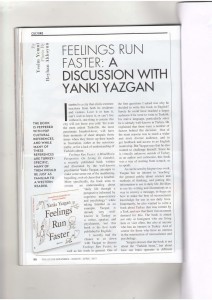
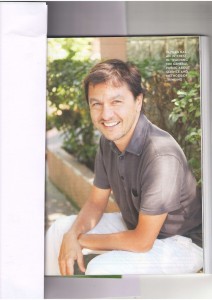
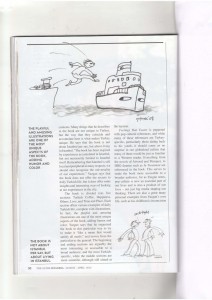
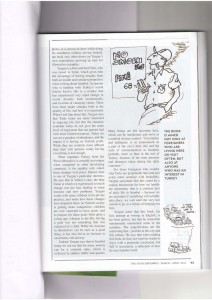
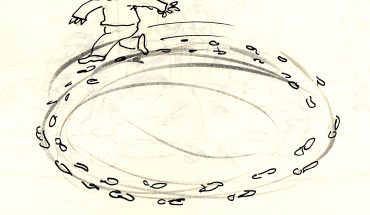
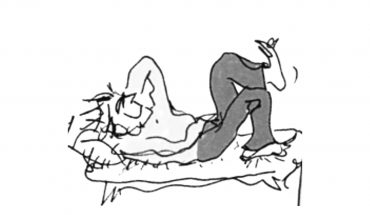
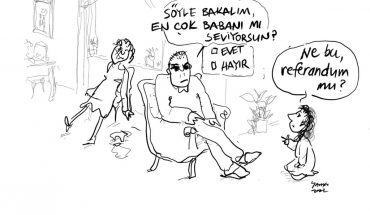
Vivian Huizenga
They do. Feelings run our lives more than we know. Yanki has hit all the most poignant themes a yabanci like me can recognize after living in Turkey for a few years. Sweet peek into a local’s thoughts put in your own language. Easy reading, notes and jots. All I want to do now is to sit and thrash out my impressions as a foreigner and have him explain it all to take care of my cognitive piece and somehow make living here feel better when I am confused and overwhelmed by differences. Mostly I try to stay intrigued!! Love this addition. Thank you Yanki